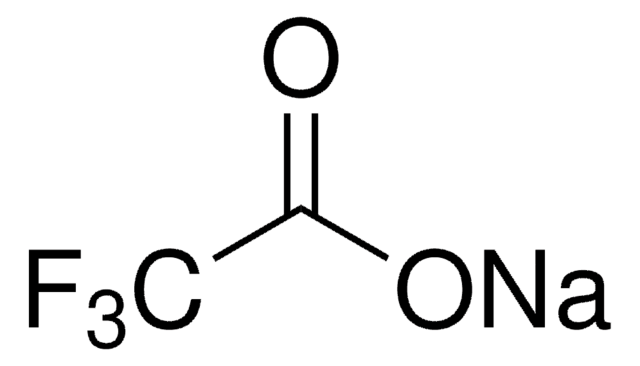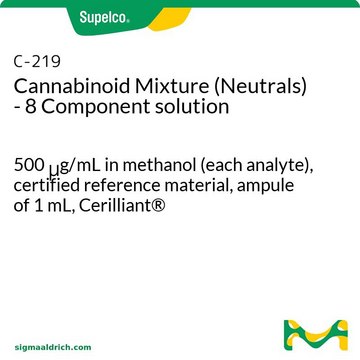5.43833
Acétate de sodium trihydrate
for HPLC LiChropur™
Synonyme(s) :
Acide acétique sodium salt trihydrate
About This Item
Produits recommandés
Niveau de qualité
Forme
solid
Température d'inflammation spontanée
1112 °F
607 °C
Technique(s)
HPLC: suitable
pH
7.5-9.2 (20 °C, 50 g/L in H2O)
Pf
58 °C
Température de transition
flash point >250 °C
Densité
1.42 g/cm3 at 20 °C
Masse volumique apparente
900 kg/m3
Température de stockage
2-30°C
Chaîne SMILES
O.O.O.[Na+].CC([O-])=O
InChI
1S/C2H4O2.Na.3H2O/c1-2(3)4;;;;/h1H3,(H,3,4);;3*1H2/q;+1;;;/p-1
Clé InChI
AYRVGWHSXIMRAB-UHFFFAOYSA-M
Vous recherchez des produits similaires ? Visite Guide de comparaison des produits
Application
- 3D Printing of Supercooled Liquids: Sodium acetate trihydrate is used in 3D printing of supercooled liquids. This research involves modeling and verifying the behavior of supercooled sodium acetate trihydrate in additive manufacturing processes. The study demonstrates its potential in creating complex structures and highlights the thermal properties essential for maintaining supercooling during the printing process. This application is significant for chemists working on advanced manufacturing techniques and material science (Brillinger, Additive Manufacturing, 2023).
- Thermal Energy Storage: Sodium acetate trihydrate is widely used in thermal energy storage systems due to its favorable phase change properties. Studies have shown its effectiveness in storing and releasing thermal energy, which is crucial for applications in solar heating and building energy efficiency. The research also explores the impact of adding water to sodium acetate trihydrate to enhance its thermal stability and latent heat capacity (Beaupere et al., Applied Sciences, 2021).
- Electrical Nucleation of Supercooled Phase Change Composites: Sodium acetate trihydrate is used in the preparation and performance analysis of controllably-triggered electrodes for the electrical nucleation of supercooled phase change composites. This study focuses on improving the efficiency and reliability of phase change materials for thermal management systems. The findings are crucial for developing advanced thermal storage solutions in various industrial applications (Chen et al., SSRN Electronic Journal, 2022).
- Residual Solidification Duration Measurements: Experimental measurements of the residual solidification duration of supercooled sodium acetate trihydrate are conducted to understand its phase change dynamics. This research provides insights into the kinetics of solidification and helps optimize the material′s use in thermal energy storage applications. The study is vital for chemists working on phase change materials and energy storage systems (Beaupere et al., International Journal of Thermal Sciences, 2020).
- Composite Phase Change Materials: Sodium acetate trihydrate is combined with pyrolytic carbon residue to create composite phase change materials. This research aims to improve the thermal cycling performance and reduce the undercooling and phase separation issues commonly associated with sodium acetate trihydrate. The study demonstrates the material′s stability and high latent heat value, making it suitable for long-term thermal energy storage applications (Yuan, Journal of Physics: Conference Series, 2022).
Autres remarques
Informations légales
Produit(s) apparenté(s)
Code de la classe de stockage
11 - Combustible Solids
Classe de danger pour l'eau (WGK)
WGK 1
Point d'éclair (°F)
Not applicable
Point d'éclair (°C)
Not applicable
Certificats d'analyse (COA)
Recherchez un Certificats d'analyse (COA) en saisissant le numéro de lot du produit. Les numéros de lot figurent sur l'étiquette du produit après les mots "Lot" ou "Batch".
Déjà en possession de ce produit ?
Retrouvez la documentation relative aux produits que vous avez récemment achetés dans la Bibliothèque de documents.
Les clients ont également consulté
Notre équipe de scientifiques dispose d'une expérience dans tous les secteurs de la recherche, notamment en sciences de la vie, science des matériaux, synthèse chimique, chromatographie, analyse et dans de nombreux autres domaines..
Contacter notre Service technique







